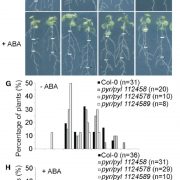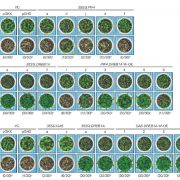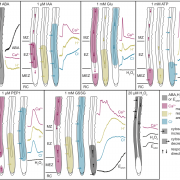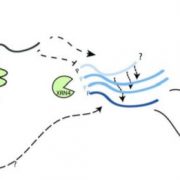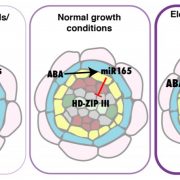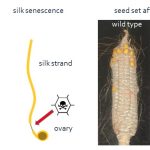Seed germination: It’s about restricting ABA biosynthesis at the chromatin
Yang and Zhao et al. examine the control of seed germination at the chromatin level.
Zhe Wu and Deyue Yang, Key Laboratory of Molecular Design for Plant Cell Factory of Guangdong Higher Education Institutes, Institute of Plant and Food Science, Department of Biology, School of Life Sciences, Southern University of Science and Technology, Shenzhen 518055, China
Background: Under appropriate conditions, seeds germinate and develop into seedlings within a few days, representing a major developmental switch for flowering plants. Like other developmental progressions, germination involves dramatic alterations of gene expression, but it is challenging to distinguish between the primary causes and secondary consequences of germination. Control of gene expression, especially the stable repression of transcription, often requires chromatin level regulation, which is poorly understood for seed germination. The phytohormone abscisic acid (ABA) represses germination. ABA biosynthesis is restricted in seeds that are capable to germinate, but whether this is a regulated process or a default/pre-set state is unclear.
Question: Loss of function of both RZ-1B and RZ-1C, a homologous pair of RNA-binding proteins with redundant functions, delays germination. What is the function of these proteins? We dissected this puzzle using genetic and epigenomic techniques.
Findings: NCED6, encoding a key enzyme in ABA biosynthesis, is progressively silenced at the transcriptional and chromatin level during germination. This requires the coordinated action of RZ-1 and the polycomb repressive complex 2, as germination is effectively blocked when both these proteins are disabled. In early imbibition, RZ-1 targets NCED6 and triggers its transcriptional repression, involving histone deacetylation and suppression of H3K4me3. This process facilitates and is followed by the establishment of H3K27me3, which mainly occurs at the onset of the seed-to-seedling transition. Therefore, among the thousands of genes that undergo altered expression during germination, the progressive silencing of NCED6 is a key trigger for germination.
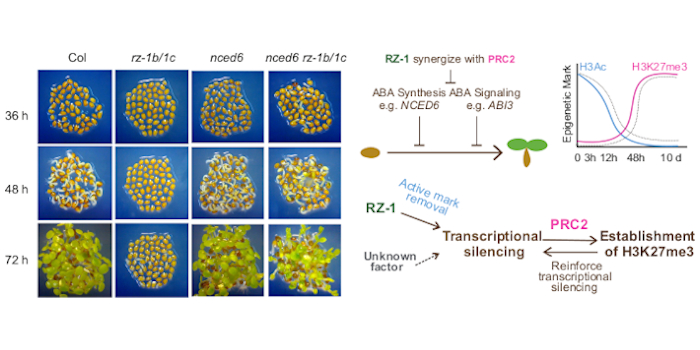 Next steps: This study raises several interesting questions. How does the RNA-binding protein RZ-1 function to transcriptionally silence NCED6? Apart from NCED6, several other genes are regulated by RZ-1 and PRC2; are they also important for germination? ABA could trigger dramatic gene expression changes through its signalling pathway; how are these ABA-mediated changes integrated with chromatin-level regulation to determine germination?
Next steps: This study raises several interesting questions. How does the RNA-binding protein RZ-1 function to transcriptionally silence NCED6? Apart from NCED6, several other genes are regulated by RZ-1 and PRC2; are they also important for germination? ABA could trigger dramatic gene expression changes through its signalling pathway; how are these ABA-mediated changes integrated with chromatin-level regulation to determine germination?
Deyue Yang, Fengli Zhao, Danling Zhu, Xi Chen, Xiangxiong Kong, Yufeng Wu, Min Chen, Jiamu Du, Li-Jia Qu and Zhe Wu. (2022). Progressive chromatin silencing of ABA biosynthesis genes permits seed germination in Arabidopsis. https://doi.org/10.1093/plcell/koac134


